College Football: The Greatest Player at Every Position in the Last 25 Years
College Football: The Greatest Player at Every Position in the Last 25 Years

College football has undergone what might best be described as a radical transformation over the last 25 years.
From the advent of the BCS to the spread of, well, the spread, the game itself has changed so much in so many fundamental ways that trying to put together a team of the all-time best players at every position is a nearly impossible task.
Of course, compiling such a squad based only on the last quarter century is no small feat either but is certainly a tad more manageable to say the least.
As such, with the kickoff of the 2011 college football season still more than three months away, let's have a look at the best player to man each position over the past quarter century.
Punter: Daniel Sepulveda, Baylor
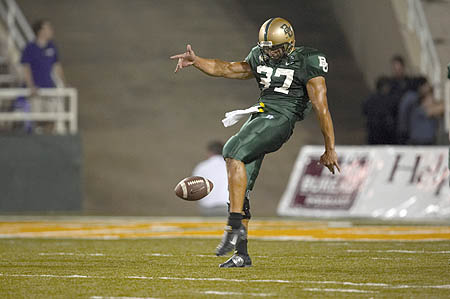
We begin with the most undervalued position of all—punter—of which Daniel Sepulveda was the best of the last 25 years after following the unlikeliest of paths to punting greatness.
Sepulveda walked on to the Baylor football team as a linebacker before the Bears moved him over to punter, a position he hadn't manned since junior high school.
Naturally, the kid from Austin earned a scholarship in 2003 went on to arguably the most prolific collegiate career a punter has ever seen, finishing his time in Waco as a four-time All-Big 12 selection, a three-time All-American and the only two-time winner of the Ray Guy Award, which is given to the best punter in all of college football each year.
Kicker: Sebastian Janikowski, Florida State

As far as special teamers with big legs whose boots lead to points are concerned, Sebastian Janikowski takes the cake.
Say what you want about Janikowski's off-field shenanigans during his three years at Florida State, but you have to admit that the guy was one heck of a kicker.
The big Pollack was the first and still only person to ever win the Lou Groza Award twice and was even good enough to be a first-round pick of the Oakland Raiders in the 2000 NFL draft.
For those who are unfamiliar with the draft, taking a placekicker in the first round is patently absurd, but "Sea-Bas" was just that good in college.
Good enough to send the ball through the uprights on kickoffs on a regular basis.
Corner: Charles Woodson, Michigan
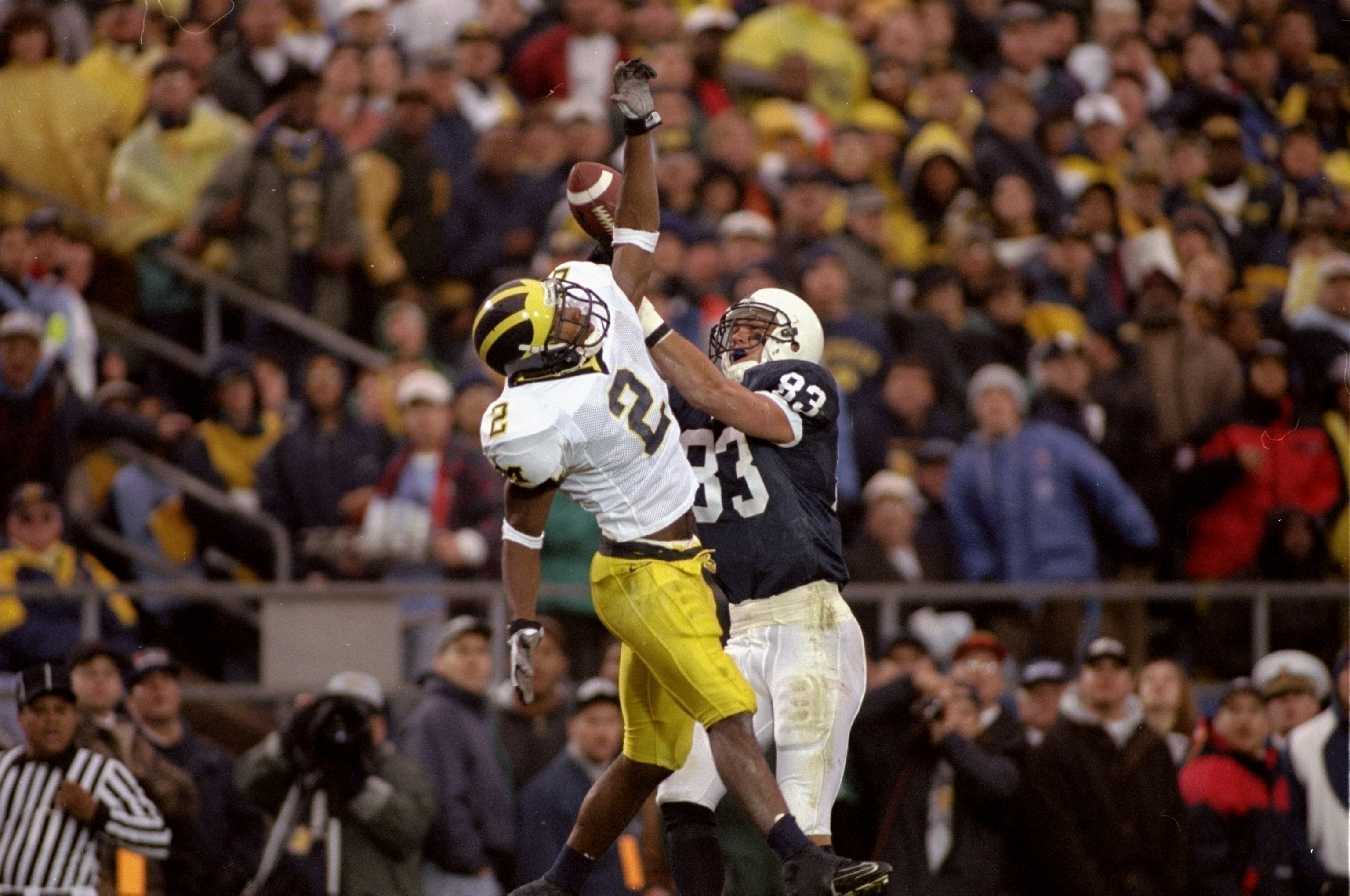
When it comes to returning kicks, few were ever better than Charles Woodson, though it certainly helps that he was also an outstanding cornerback.
Woodson was twice a first-team All-American at Michigan and enjoyed one of the most awarded seasons in college football history in 1997, during which he earned the Bronko Nagurski Award, the Chuck Bednarik Trophy, the Jim Thorpe Award, the Walter Camp Award and, for good measure, the Heisman Trophy.
Mind you, Woodson was the first primarily defensive player to ever win the Heisman.
Corner: Deion Sanders, Florida State
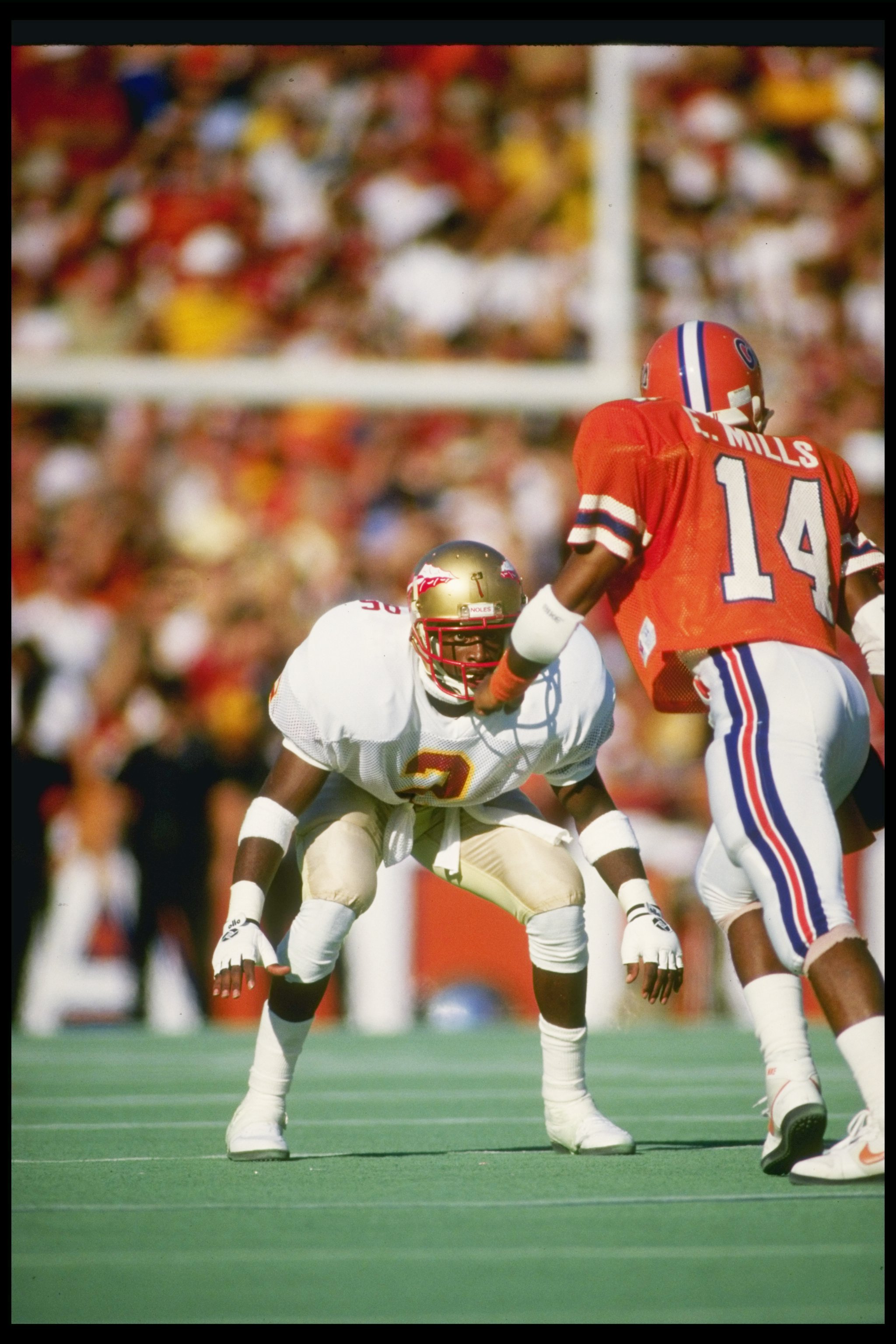
Less than a decade before Charles Woodson put his stamp on college football history, Deion Sanders was the most talked-about defensive back on the scene and rightfully so.
Deion was a three-time All-American for Bobby Bowden's Florida State Seminoles and took home the Jim Thorpe Award in 1988 while competing in baseball and track on the side.
Did I mention he was a pretty darn good return man as well?
Safety: Eric Berry, Tennessee
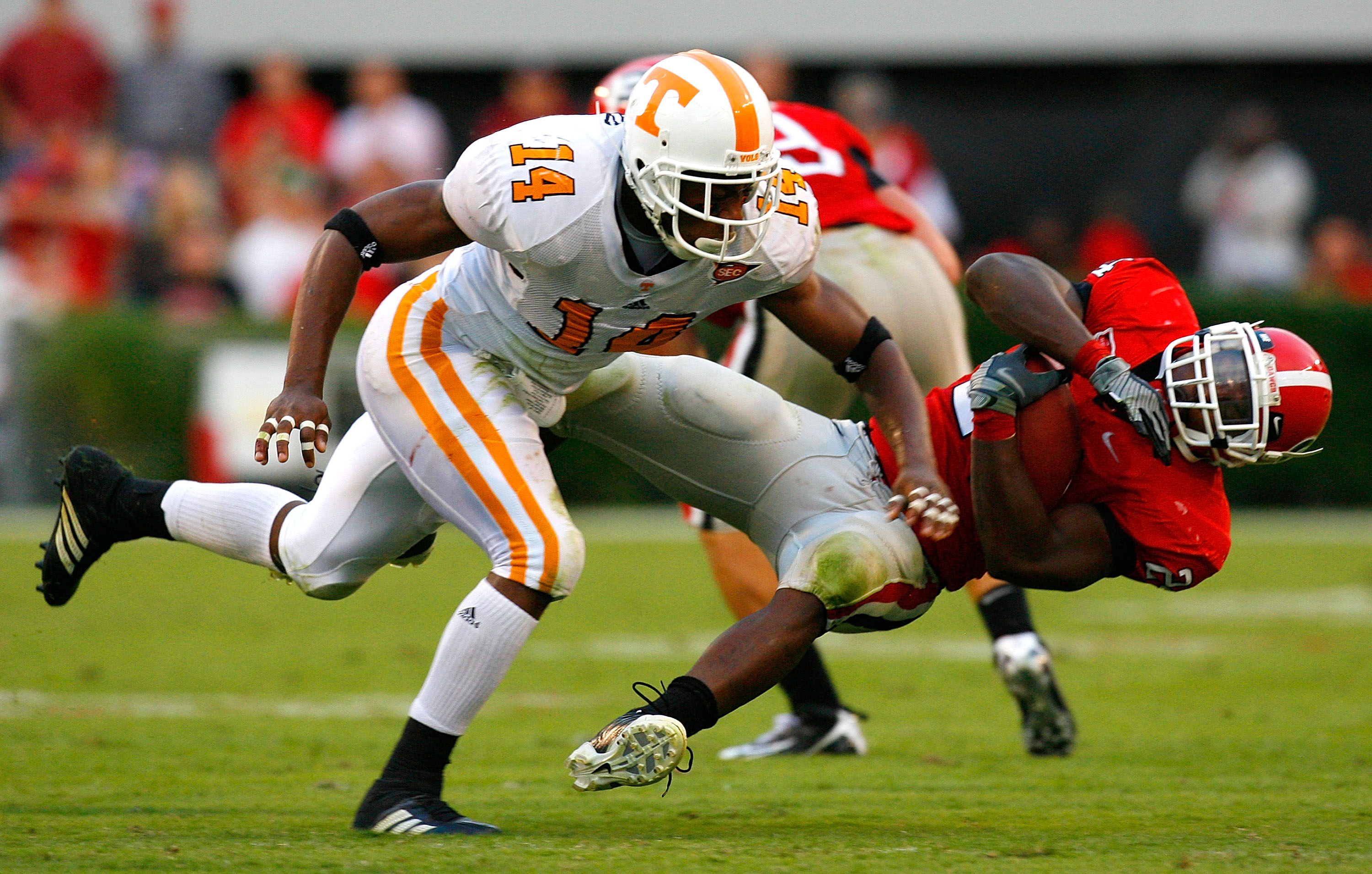
The name "Eric Berry" may not be the first or even second to roll off the tongue of most college football fans when discussing the best safeties of the last 25 years, but it certainly should be.
Berry arrived at Tennessee as the 2006 Gatorade High School Player of the Year in Georgia and didn't wait long to live up to the hype, earning first-team Freshman All-America and second-team All-SEC recognition in 2007.
The trajectory of Berry's three-year stint in Knoxville only went up from there, as he finished his collegiate career as a two-time unanimous first-team All-American and as the 2009 Jim Thorpe Award winner while also being named to Sports Illustrated All-Decade Team for the 2000s.
Safety: Ed Reed, Miami
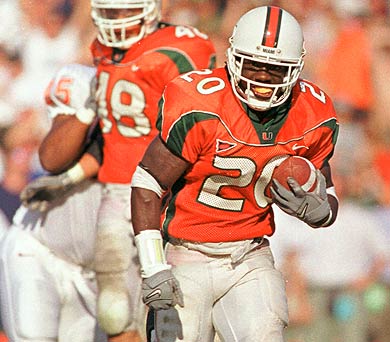
Anyone who has followed the NFL over the past decade knows that Ed Reed is one of the best safeties to ever play the game.
And anyone who followed the University of Miami in the late 1990s and early 2000s could have predicted the same.
Reed was a three-time consensus All-American for the Hurricanes, whose career record for interceptions still belongs to him.
The current Baltimore Ravens safety was also a key cog in the 'Canes team that won the national championship in 2001, when he led the nation with nine picks for 209 yards and three touchdowns.
Linebacker: Paul Posluszny, Penn State
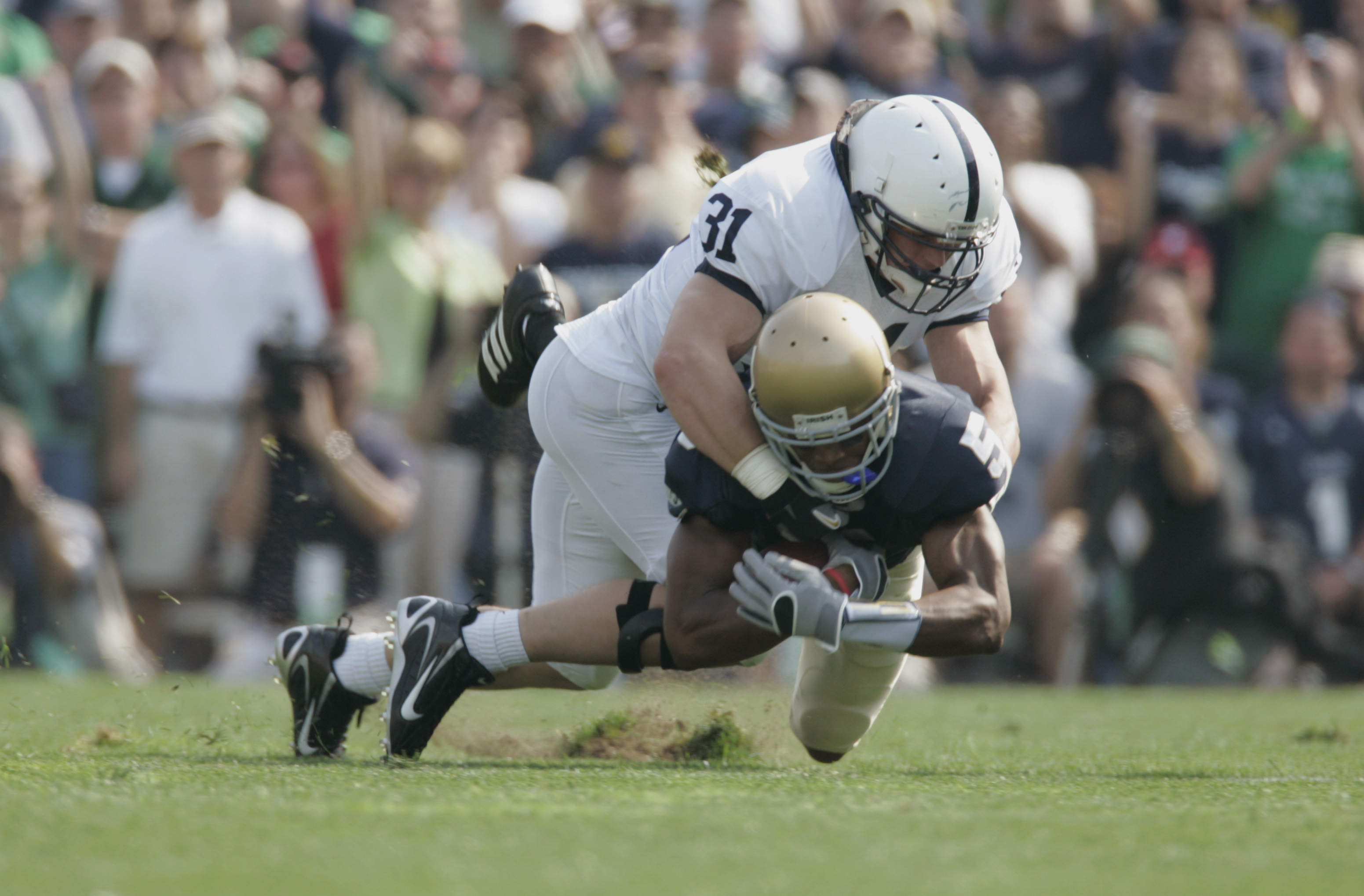
When it comes to linebackers, few have been anywhere near as prolific and decorated at the position as Paul Posluszny.
Posluszny's tenure at Penn State was nothing short of legendary, as he finished his four years as the school's all-time leading tackler with 372 tackles while twice earning the Chuck Bednarik Award and first-team All-America honors, along with a lone Dick Butkus Award in 2005.
Most impressive of all, however, is the fact that after partially tearing two ligaments in his knee during the Nittany Lions' victory over Florida State in the 2006 Orange Bowl, Posluszny returned to school for his senior season and had the best year of his career, during which he piled up an astounding 116 tackles.
Linebacker: Pat Fitzgerald, Northwestern
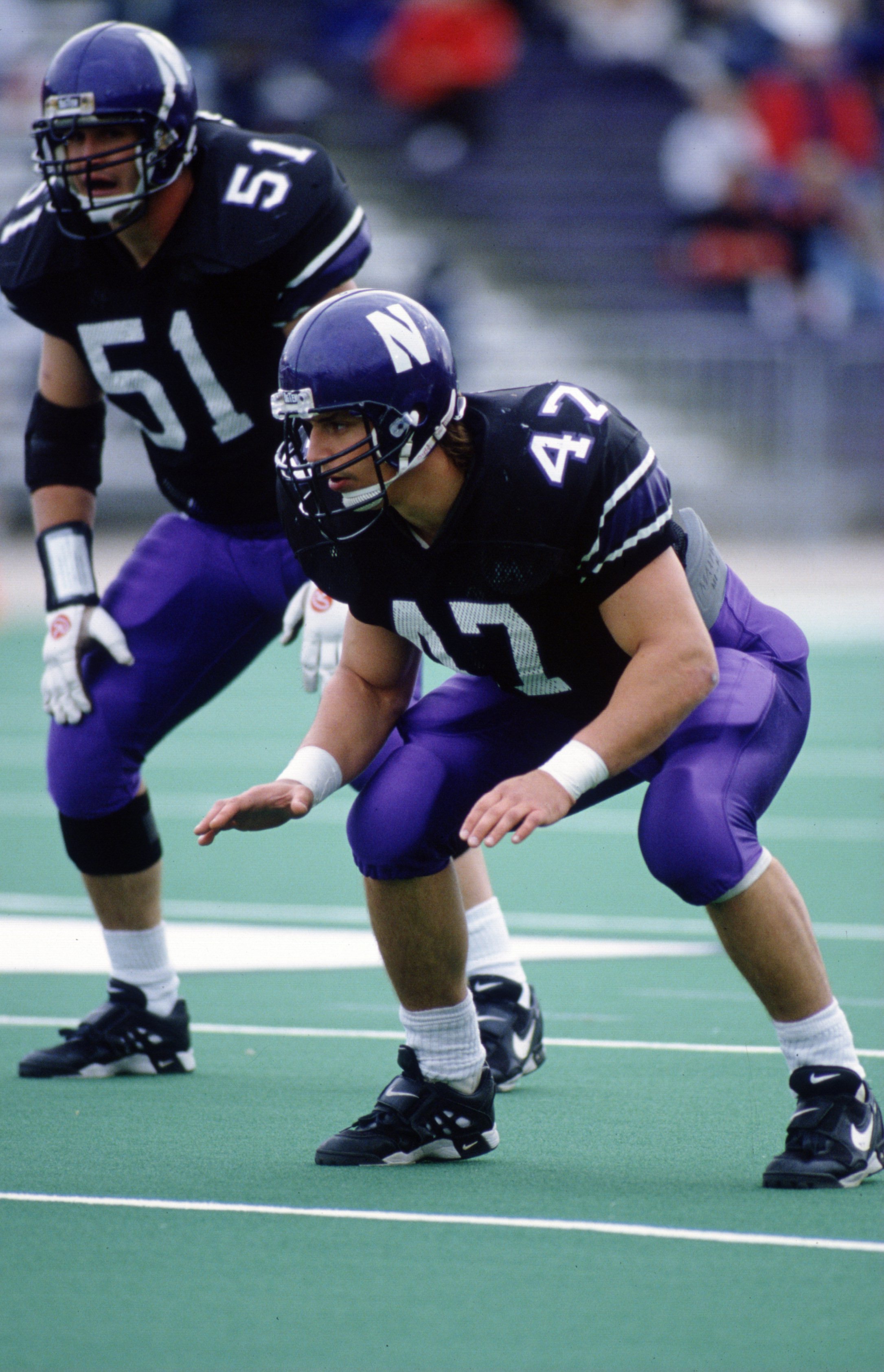
Paul Posluszny isn't the only person to have ever won the Bednarik Award twice.
That distinction also belongs to former Northwestern linebacker and current head coach Pat Fitzgerald, who also has two Bronko Nagurski Awards in his trophy case.
Fitzgerald was one of the key catalysts behind the Wildcats' run to the 1996 Rose Bowl, though a broken leg toward the end of the season kept him from playing in the school's first appearance in the Grand Daddy of Them All since 1949.
Like Posluszny, Fitzgerald returned from injury to once again lead his team to the college football postseason while solidifying himself as a College Football Hall of Famer—an honor that became official with his induction in July of 2009.
Linebacker: Rey Maualuga, USC
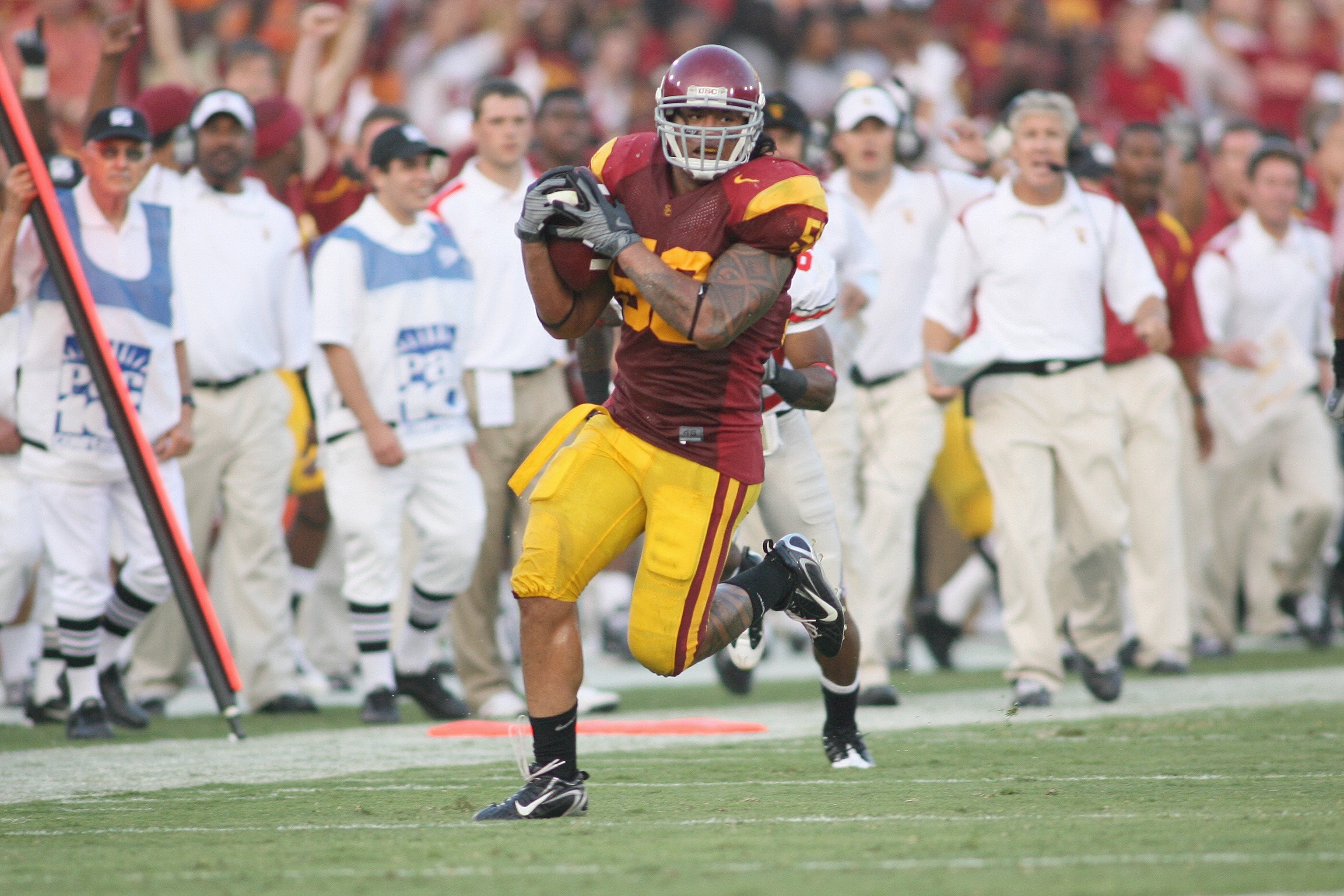
No discussion of the best collegiate linebackers of the last quarter century would be complete without at least a nod to USC, also known as "Linebacker U."
Choosing one from among the last two-and-a-half decades of Trojans greats is a difficult task, but one name stands out from the rest—Rey Maualuga.
Maualuga was a dominant force on defense for Pete Carroll's Trojans during his four years in Los Angeles, finishing his career as a consensus All-American, Bednarik Award-winner and Rose Bowl MVP in 2008.
Defensive End: Grant Wistrom, Nebraska
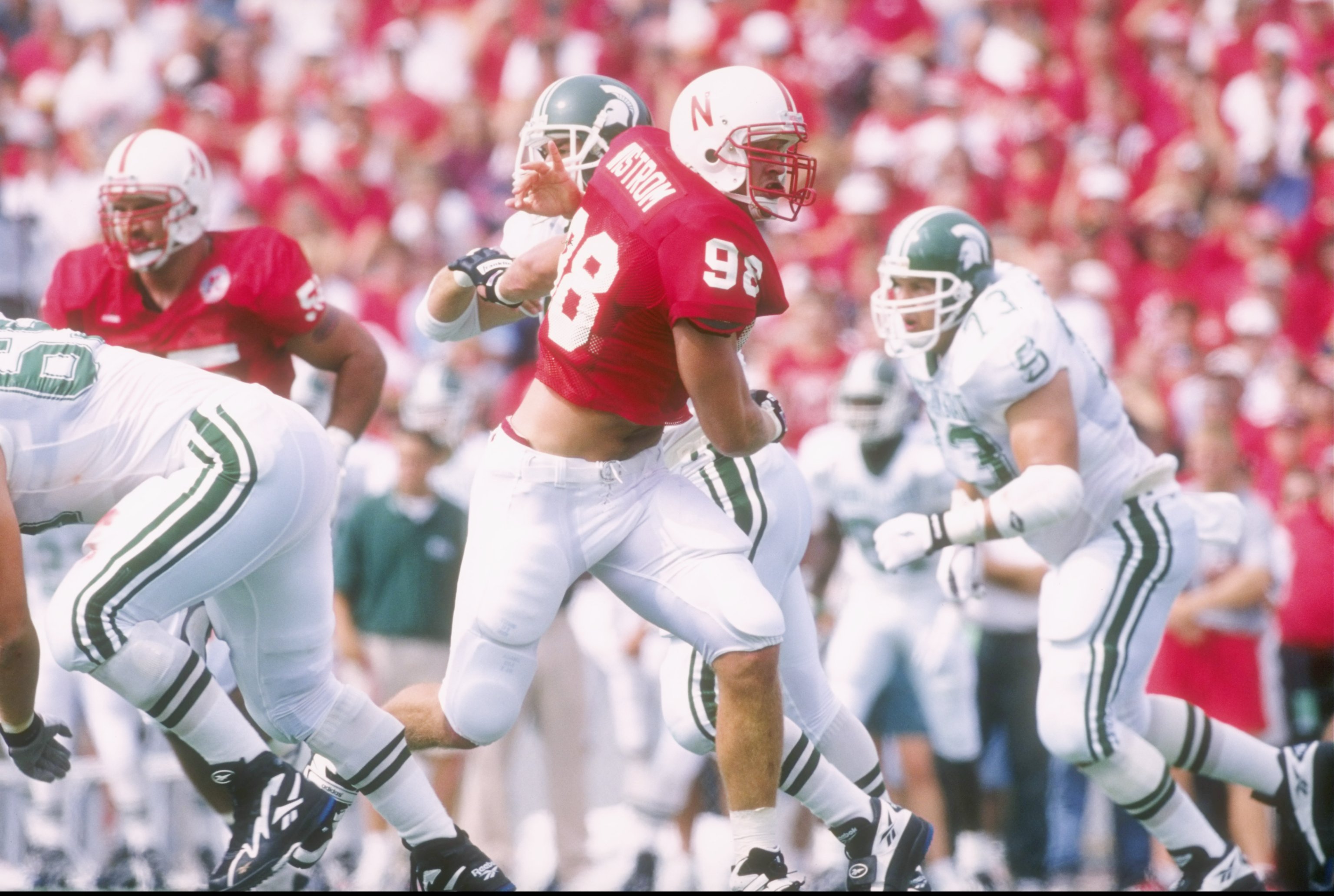
Just as Maualuga was a staple of the Trojans' dynasty of the 2000s, so too was Grant Wistrom the heart and soul of Nebraska's dominance of the mid-1990s.
Individually, Wistrom was twice an All-American, twice the Big 12 Defensive Player of the Year and once the winner of the Vince Lombardi Award.
As the enforcer of the Black Shirt defense, Wistrom led the Cornhuskers to 49 wins in 51 tries three national titles.
All of which earned Wistrom a spot in the College Football Hall of Fame in 2009.
Defensive End: Terrell Suggs, Arizona State
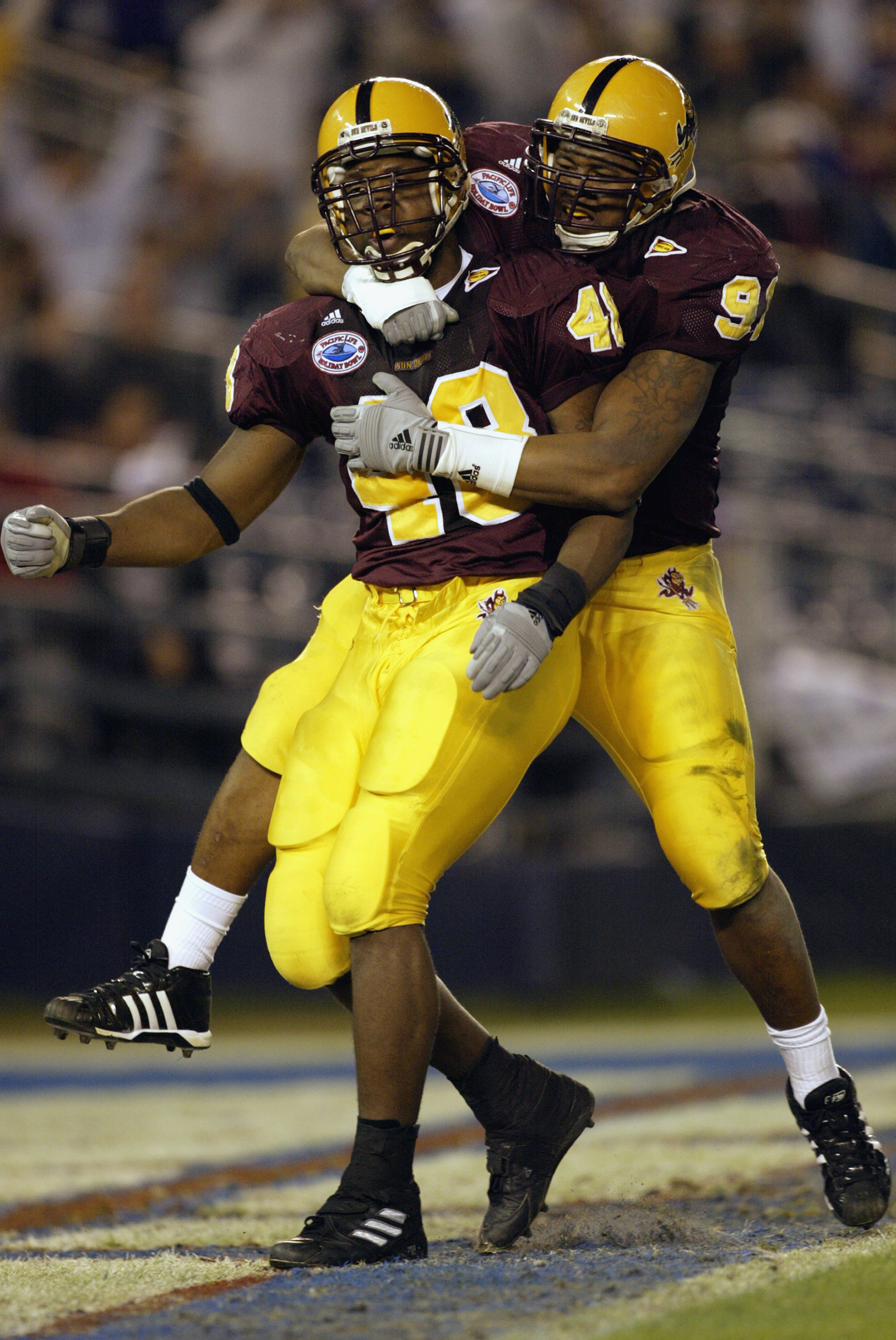
Terrell Suggs was never as consistently dominant as Grant Wistrom in college, but he was arguably better during his span of greatness at Arizona State.
That span hit its peak in 2002, when Suggs set the NCAA record for sacks in a single season with 24 quarterback takedowns on the way to earning the Ted Hendricks Award, the Lombardi Award and the Nagurski Trophy.
Defensive Tackle: Ndamukong Suh, Nebraska
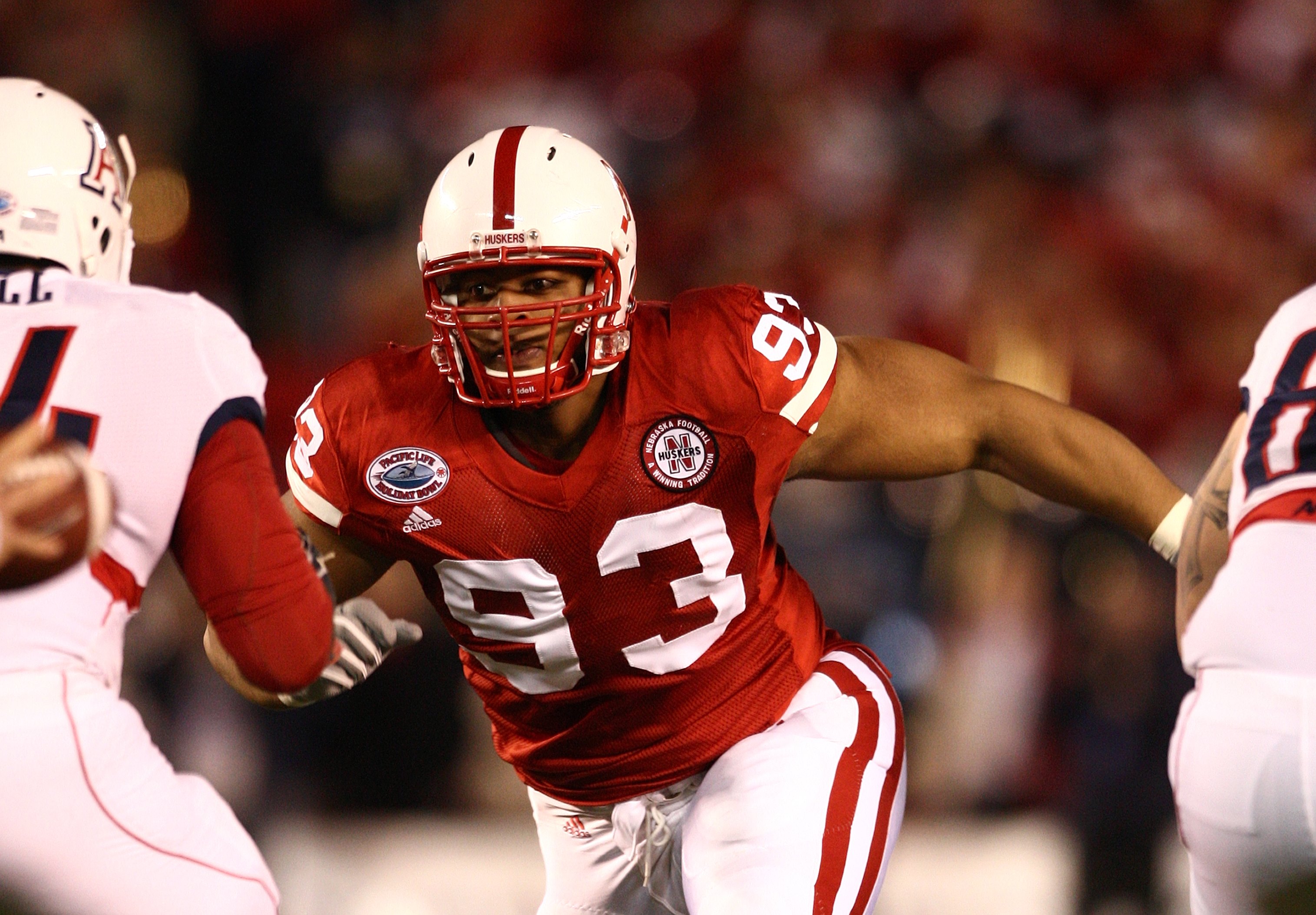
As good as Suggs was during his junior year, it's hard to say that he was in the same stratosphere as Ndamukong Suh, particularly during his senior season.
That year, Suh accounted for 85 tackles and 12 sacks while almost single-handedly leading Nebraska to an upset of BCS-bound Texas in the Big 12 Championship Game, though still earning game MVP honors.
For his efforts that year, Suh was given consensus first-team All-America honors while coming home with the Nagurski Award, the Bednarik Award and the Outland Trophy while finishing fourth in Heisman balloting and being the first defensive player to ever be named the 2009 AP Player of the Year.
Defensive Tackle: Glenn Dorsey, LSU
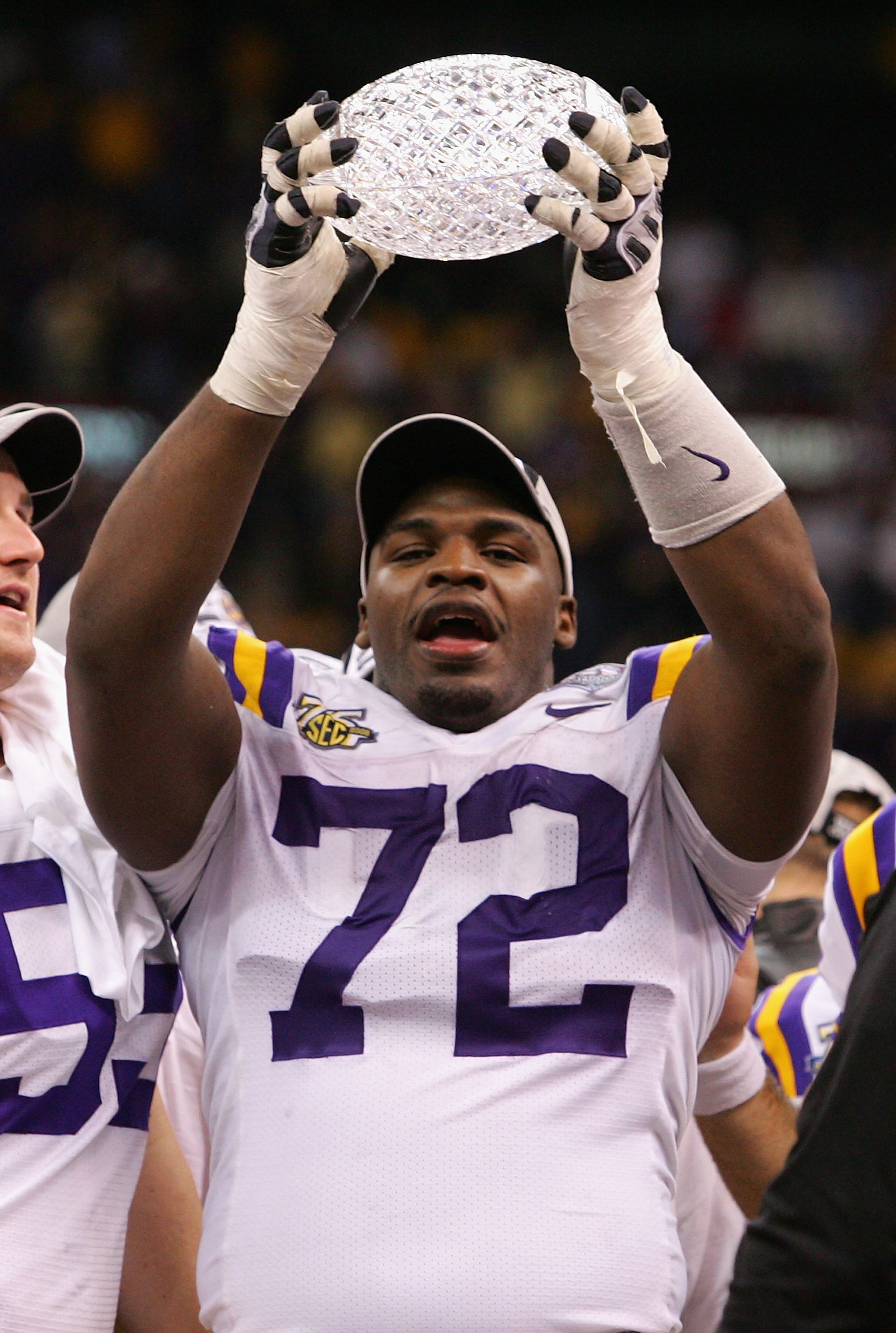
Glenn Dorsey was the closest thing there was to Ndamukong Suh back in 2007, when he came away with the Lombardi Award, the Outland Trophy, the Nagurski Trophy, the Lott Trophy and the SEC Defensive Player of the Year Award.
Dorsey was also twice an All-American while leading the LSU Tigers to the 2007 BCS National Championship.
Center: Greg Eslinger, Minnesota
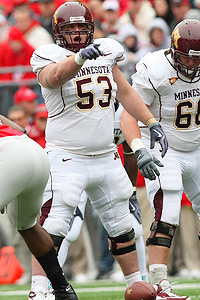
Switching to the offensive side of things, the title of best offensive center of the last 25 years belongs solely to Greg Eslinger.
Eslinger was a four-year starter at Minnesota whose efforts were firmly recognized in 2005, when he won the Outland and Rimington Trophies to go alongside with his selection as a consensus All-American and Big Ten Offensive Lineman of the Year.
Offensive Guard: Aaron Taylor, Nebraska
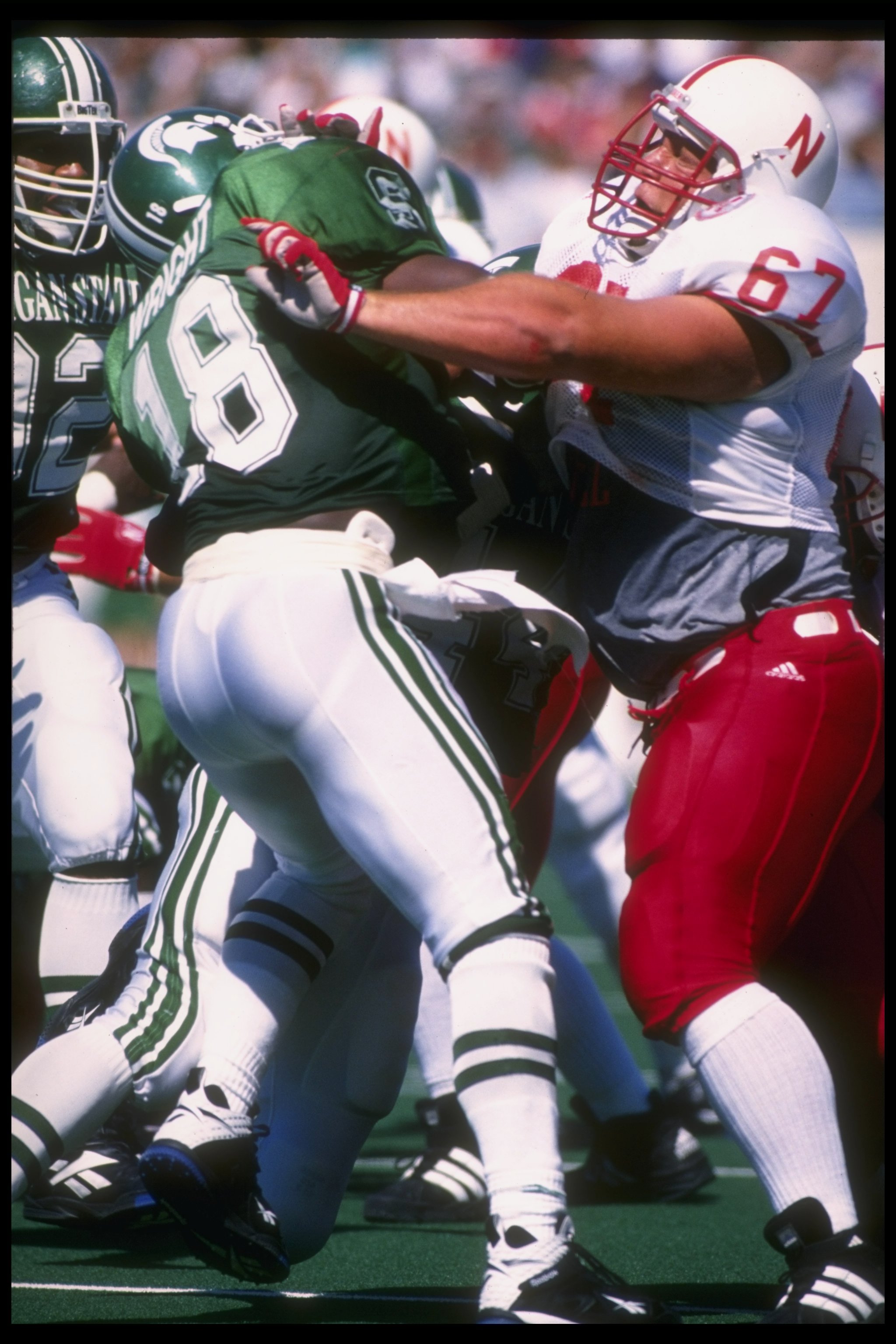
Aaron Taylor could just as easily be on the list as a center, but we'll keep him at offensive guard for the purposes of this list.
Taylor was an integral part of the Nebraska teams that won three national titles in the mid-1990s, serving as a key blocker for the Cornhuskers offense that was so masterfully orchestrated by quarterback Tommie Frazier.
Taylor took home the Outland Trophy in 1997 and has since been named to Sports Illustrated's "NCAA Football All-Century Team."
Offensive Guard: Will Shields, Nebraska
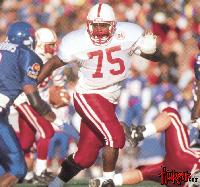
Aaron Taylor followed in the rather large footsteps Will Shields at Nebraska.
Like Taylor, Shields was a consensus first-team All-American and a winner of the Outland Trophy, though his honors came in 1992.
Shields will be remembered more for his NFL exploits as a 12-time Pro Bowler and nine-time All-Pro, though he clearly laid the foundation for a successful pro career during his time with Big Red in Lincoln.
Offensive Tackle: Jonathan Ogden, UCLA
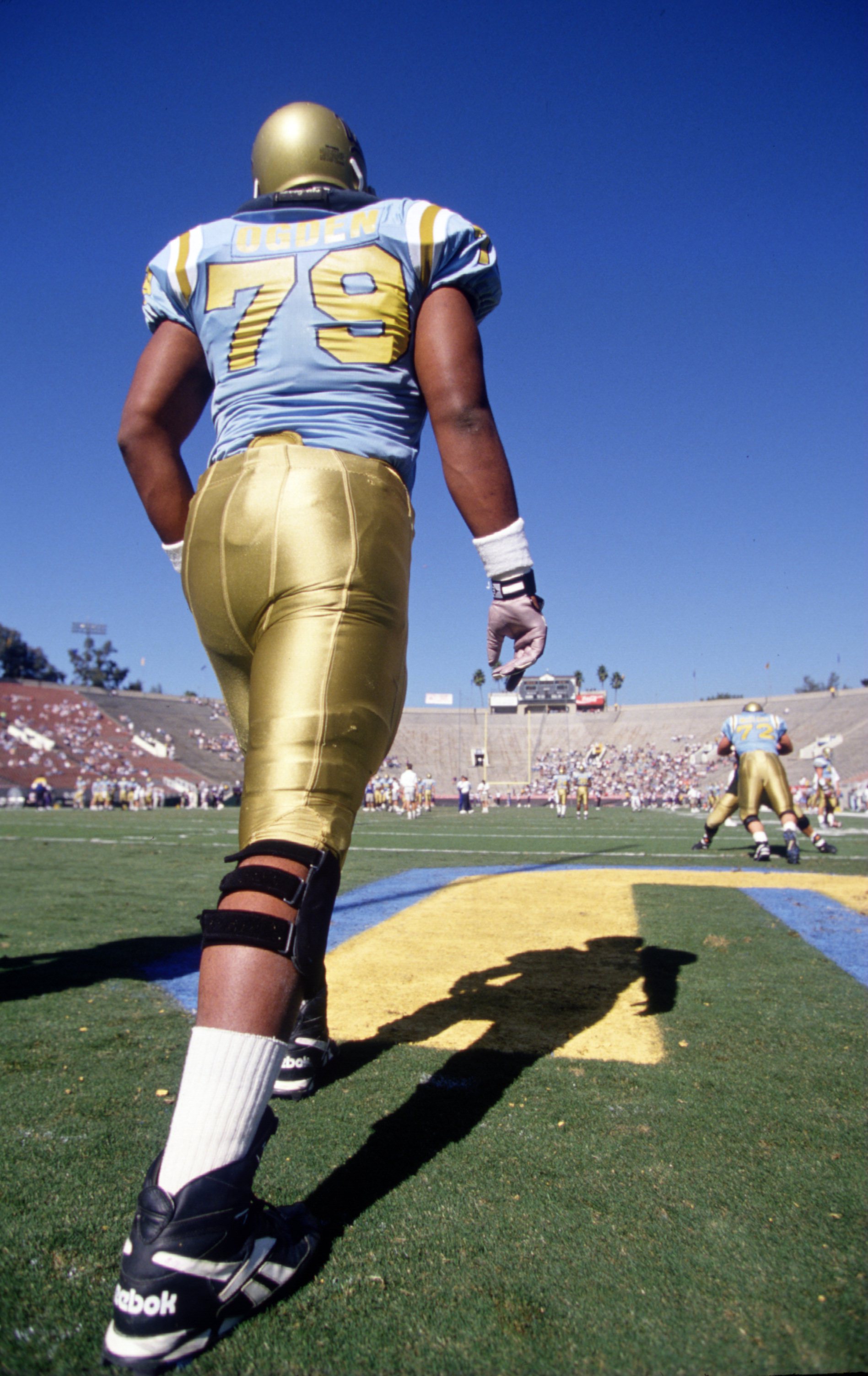
Three years after Will Shields garnered the Outland Trophy, Jonathan Ogden earned the same honor while keeping quarterbacks clean at UCLA.
Ogden started at left tackle for the Bruins for all four of his years in Westwood, the last of which saw him named a first-team All-American.
Offensive Tackle: Orlando Pace, Ohio State
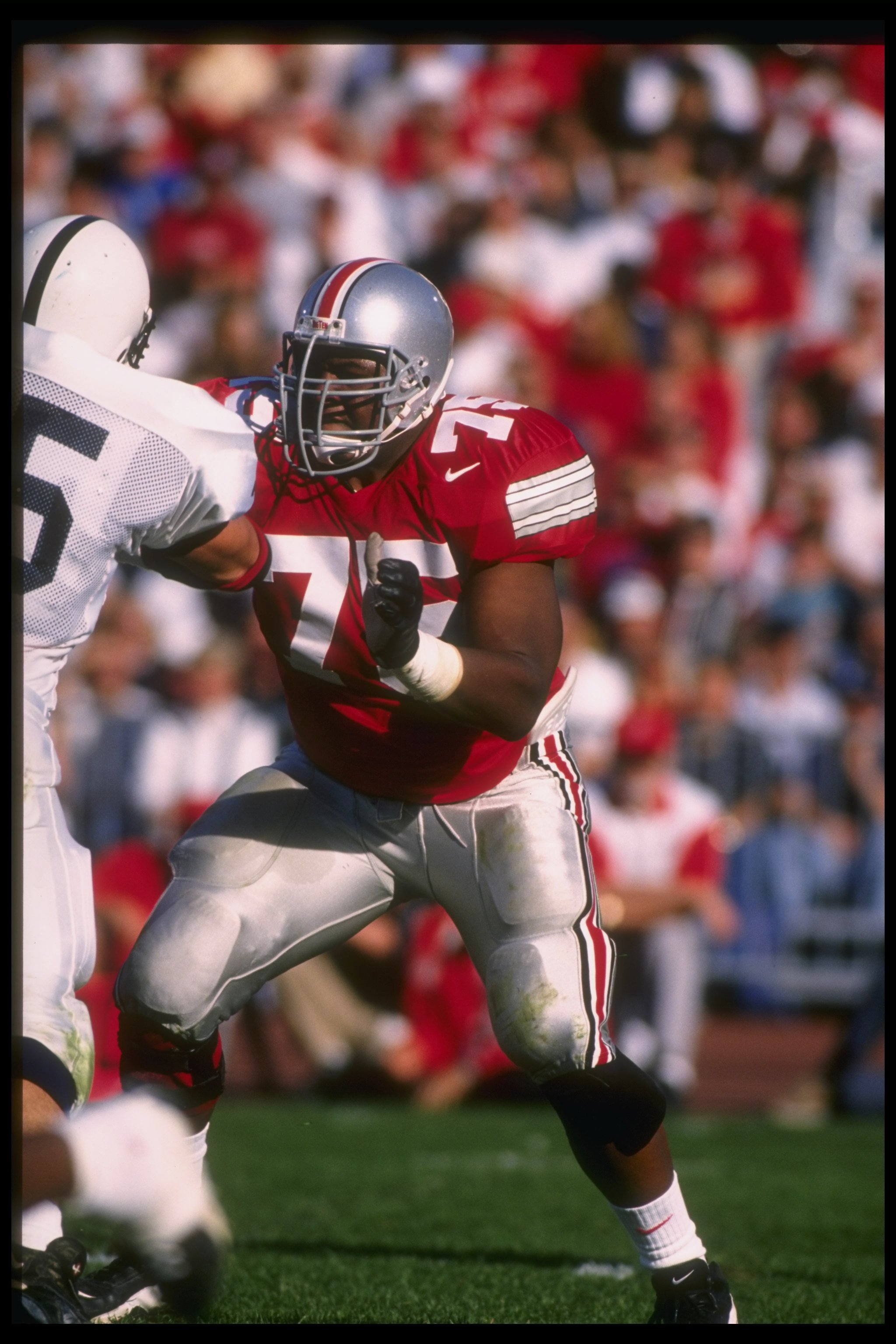
As good as Jonathan Ogden was at UCLA during the mid-1990s, Orlando Pace was on an entirely different level during his time playing for Ohio State around the same time.
Pace won the Outland Trophy the very next year, along with his second consecutive Lombardi Award, while playing his way into a starting spot on Sports Illustarted All-Century team.
The most lasting part of Pace's legacy, however, will undoubtedly be the term "pancake block," which skyrocketed in popularity during his dominance in Columbus.
Tight End: Dallas Clark, Iowa
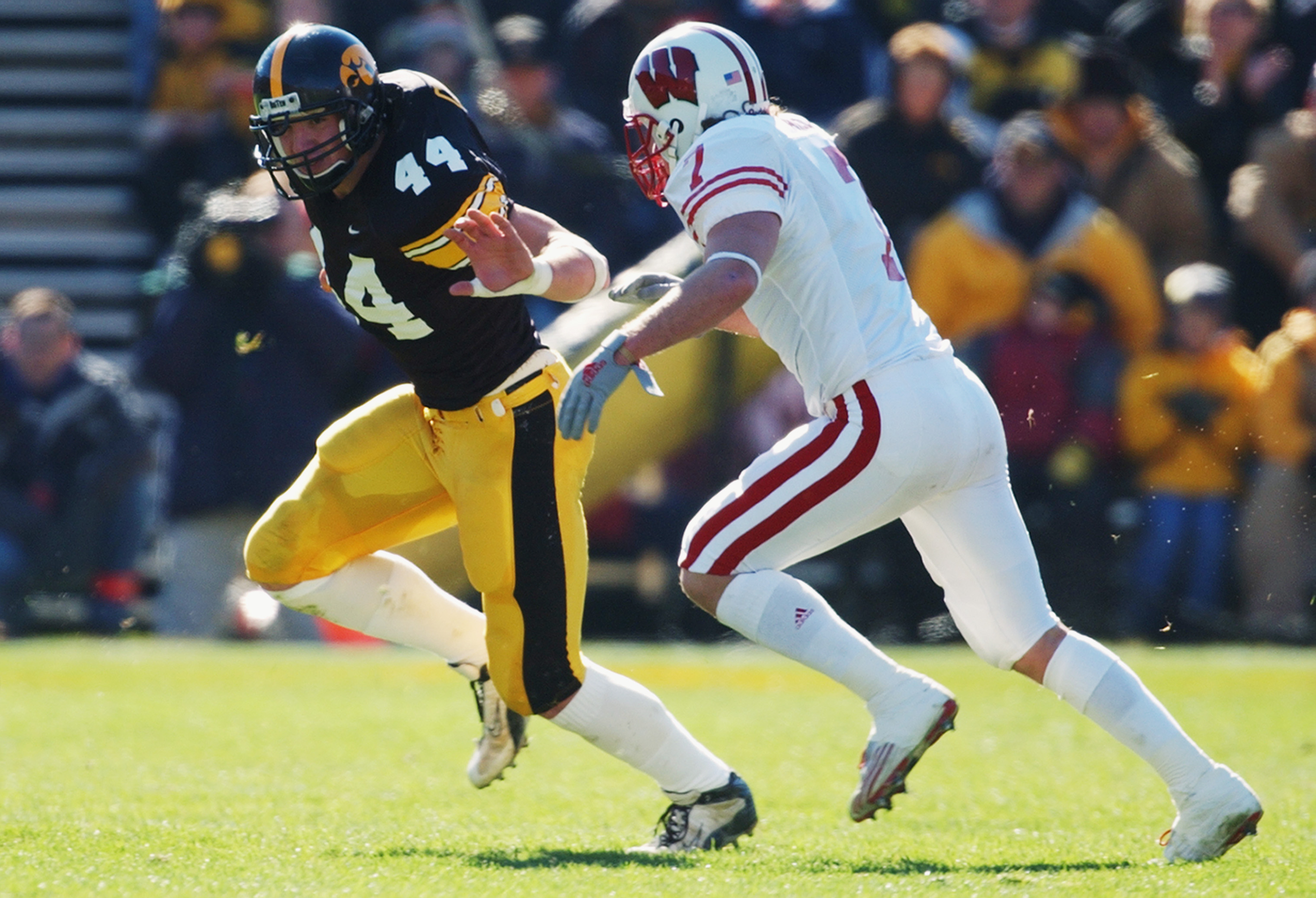
Compared to everyone else on this list, Dallas Clark was a late bloomer. Clark didn't even play tight end until his redshirt sophomore season in 2001, when the Iowa coaching staff switched him over from being a scarcely used linebacker and special teams gunner.
Clark truly rose to prominence during his junior year, when he was given the John Mackey Award and a spot on the All-American first team while leading the Hawkeyes to the Big Ten title and a spot in the 2003 Orange Bowl.
Wide Receiver: Randy Moss, Marshall
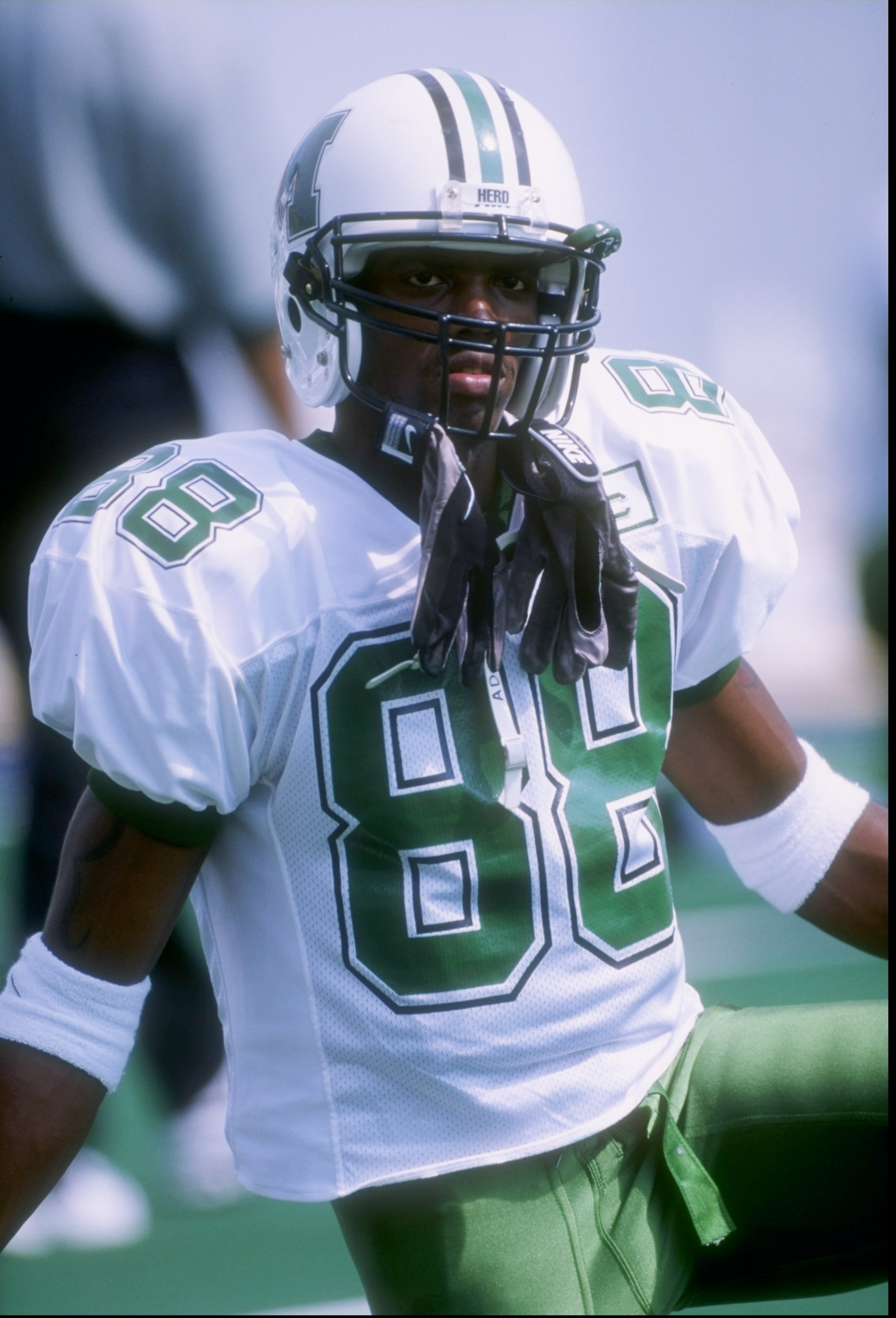
Randy Moss was anything but a late bloomer in college, though it did take him some time to get his act together off the field before he could contribute meaningfully while on it.
And, boy, did he ever contribute.
After leaving Florida State on account of drug charges, Moss spent two years at Marshall, where he accumulated 3,529 yards and 54 touchdowns in two years and was named a first-team All-American and given the Biletnikoff Award once the Thundering Heard switched over to Division I-A in 1997.
Wide Receiver: Michael Crabtree, Texas Tech
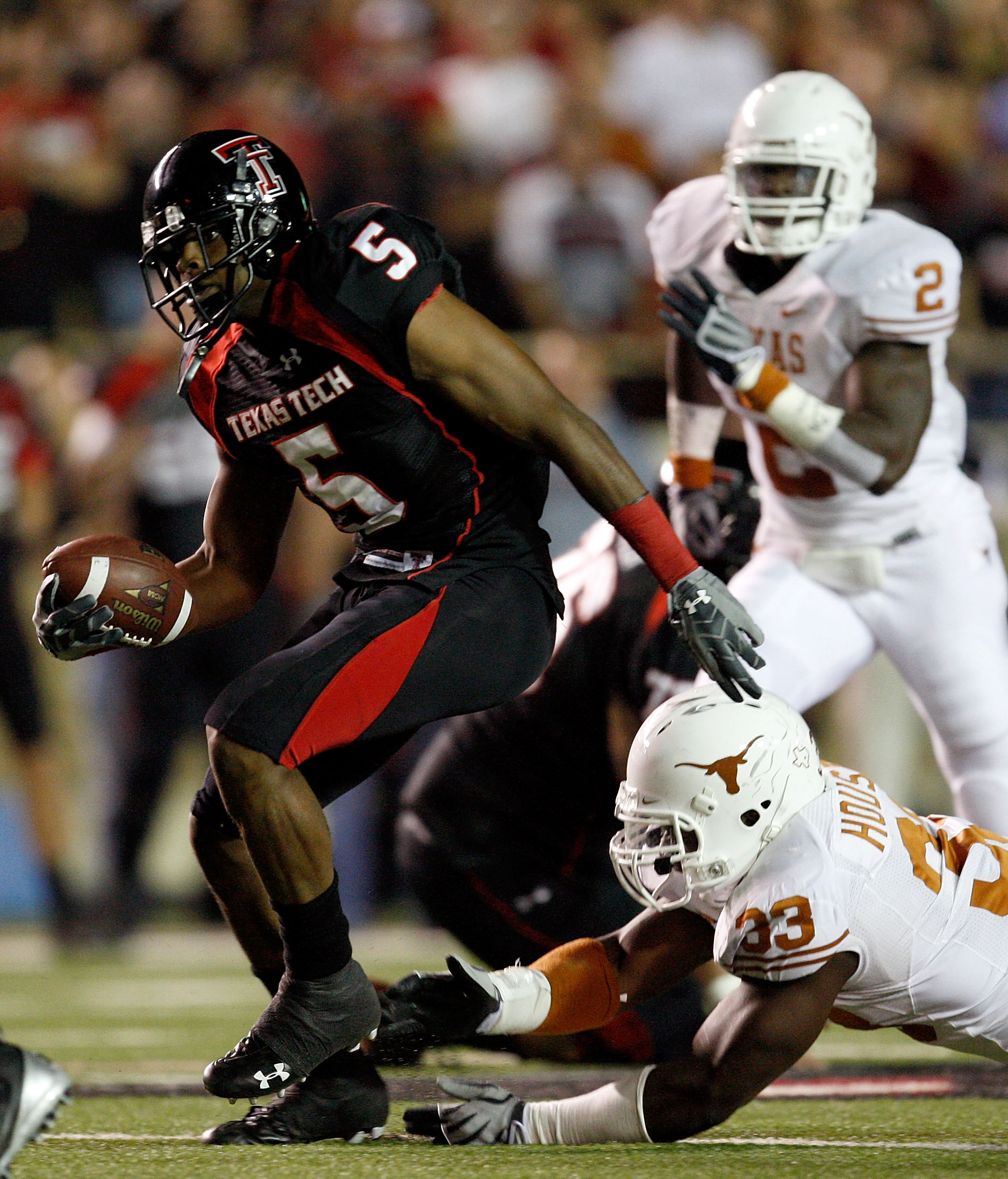
The splash left behind by Michael Crabtree may not have been as big on the whole as that of Randy Moss, but it was arguably just as important.
Crabtree became the first ever two-time winner of the Biletnikoff Award after taking home the honor in 2007 and 2008, a feat made even more impressive by the fact that those were the only two years during which he played college football.
Along with those distinctions, Crabtree was twice a first-team All-American and even made the cover of EA Sports' NCAA Football 10.
Running Back: Ricky Williams, Texas
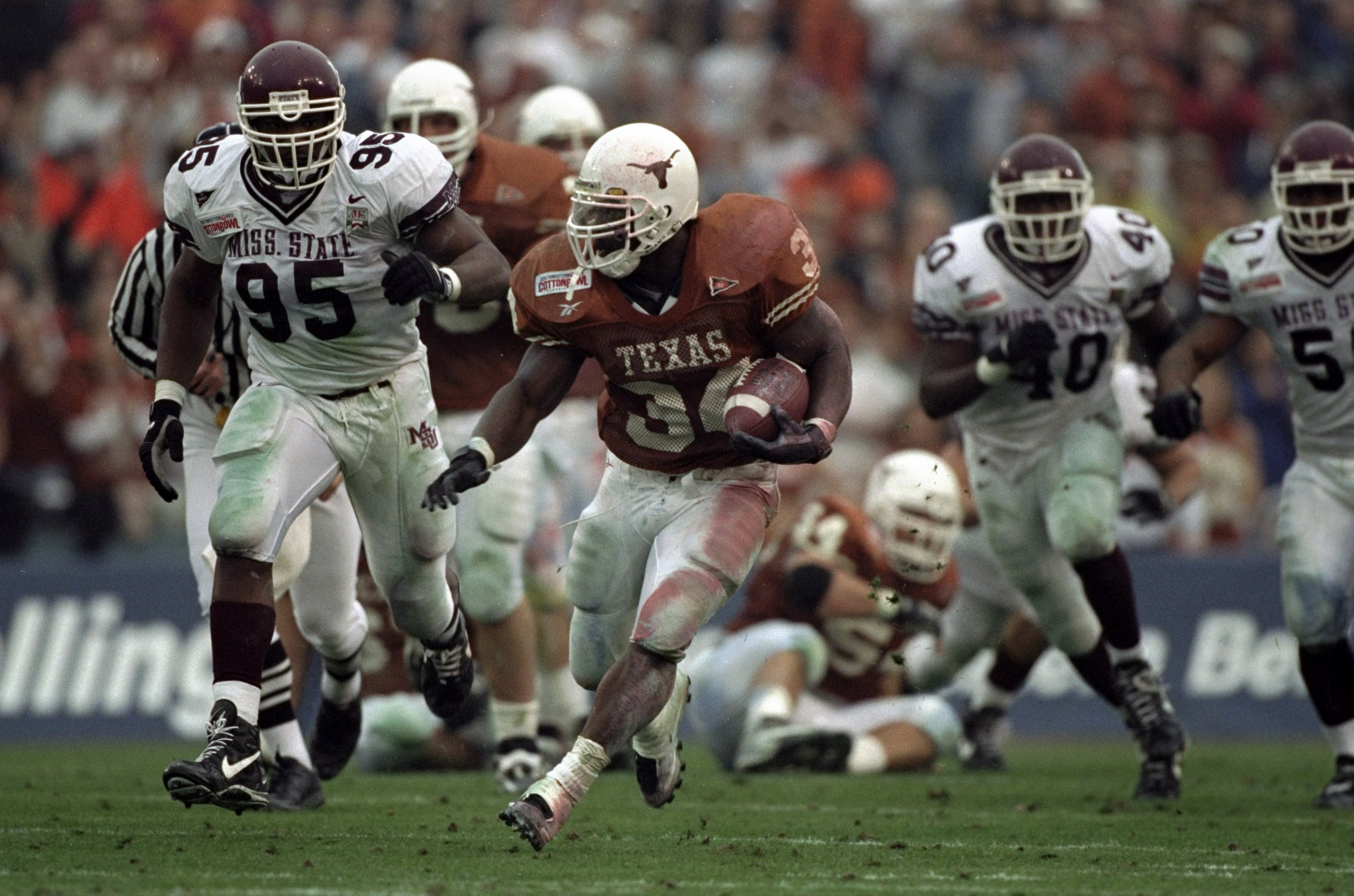
A decade prior to Michael Crabtree's short run of dominance at Texas Tech, Ricky Williams was running roughshod over anyone and everyone across the college football landscape for the Texas Longhorns.
Williams finished his career as the NCAA's all-time leading rusher and still lays claim to 20 different NCAA records, along with an impressive list of awards, including two Doak Walker Awards, two Jim Brown Trophies, the Walter Camp Award, the Maxwell Award, the AP College Player of the Year award and, of course, the 1998 Heisman Trophy.
Running Back: Ron Dayne, Wisconsin
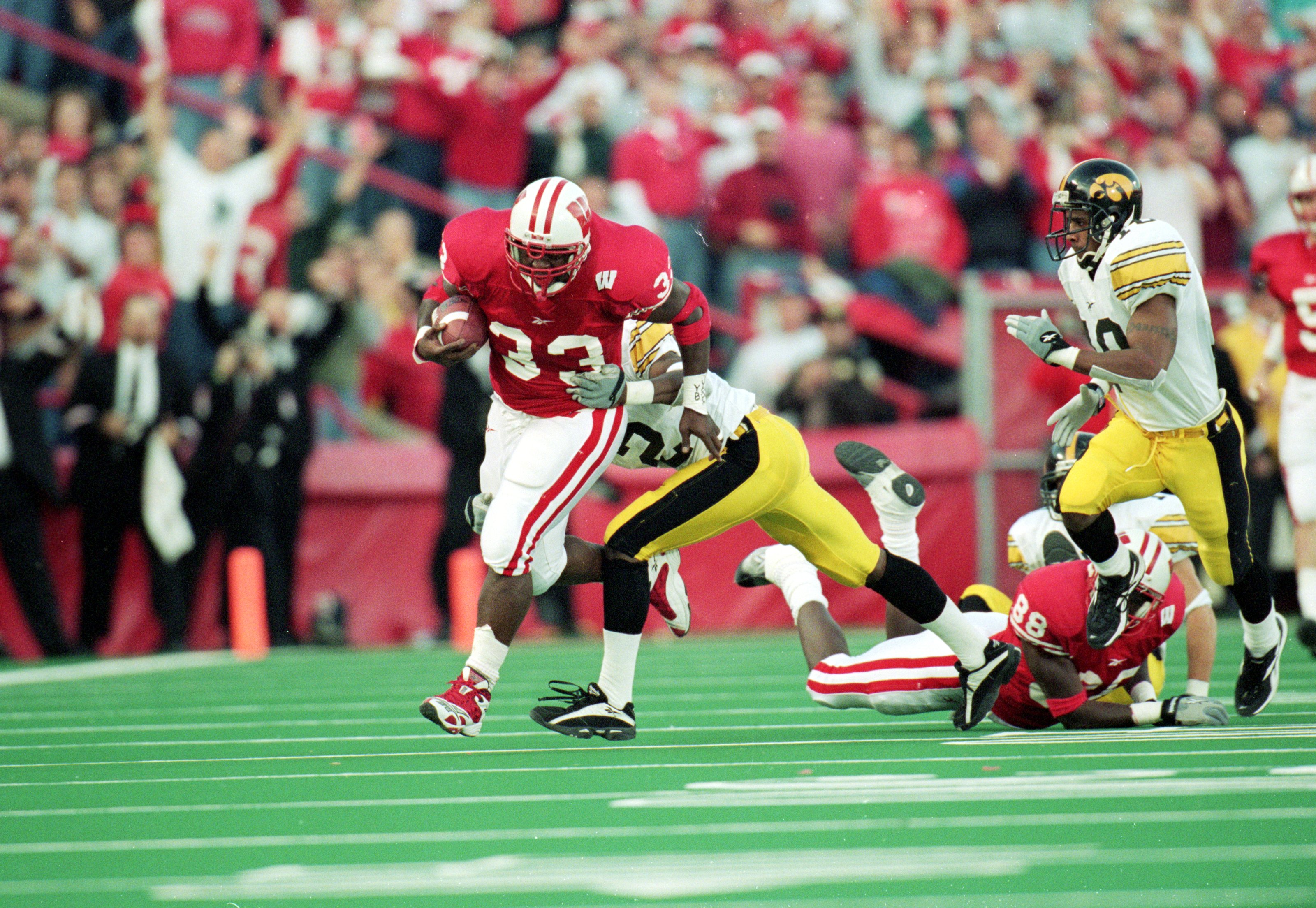
Just one year after Ricky Williams left the scene, Ron Dayne stepped in and set the NCAA career rushing record for himself as just one of many impressive accomplishments for the Badger great.
"The Dayne Train" was a four-year starter at running back for Barry Alvarez at Wisconsin, using a workman-like running style to punish his opponents down after down.
In the end, Dayne left Madison with a veritable litany of distinctions, the most notable of which being back-to-back Rose Bowl MVPs, the Maxwell Award, the Walter Camp Award, the Doak Walker Award and the 1999 Heisman Trophy.
Quarterback: Tommie Frazier, Nebraska
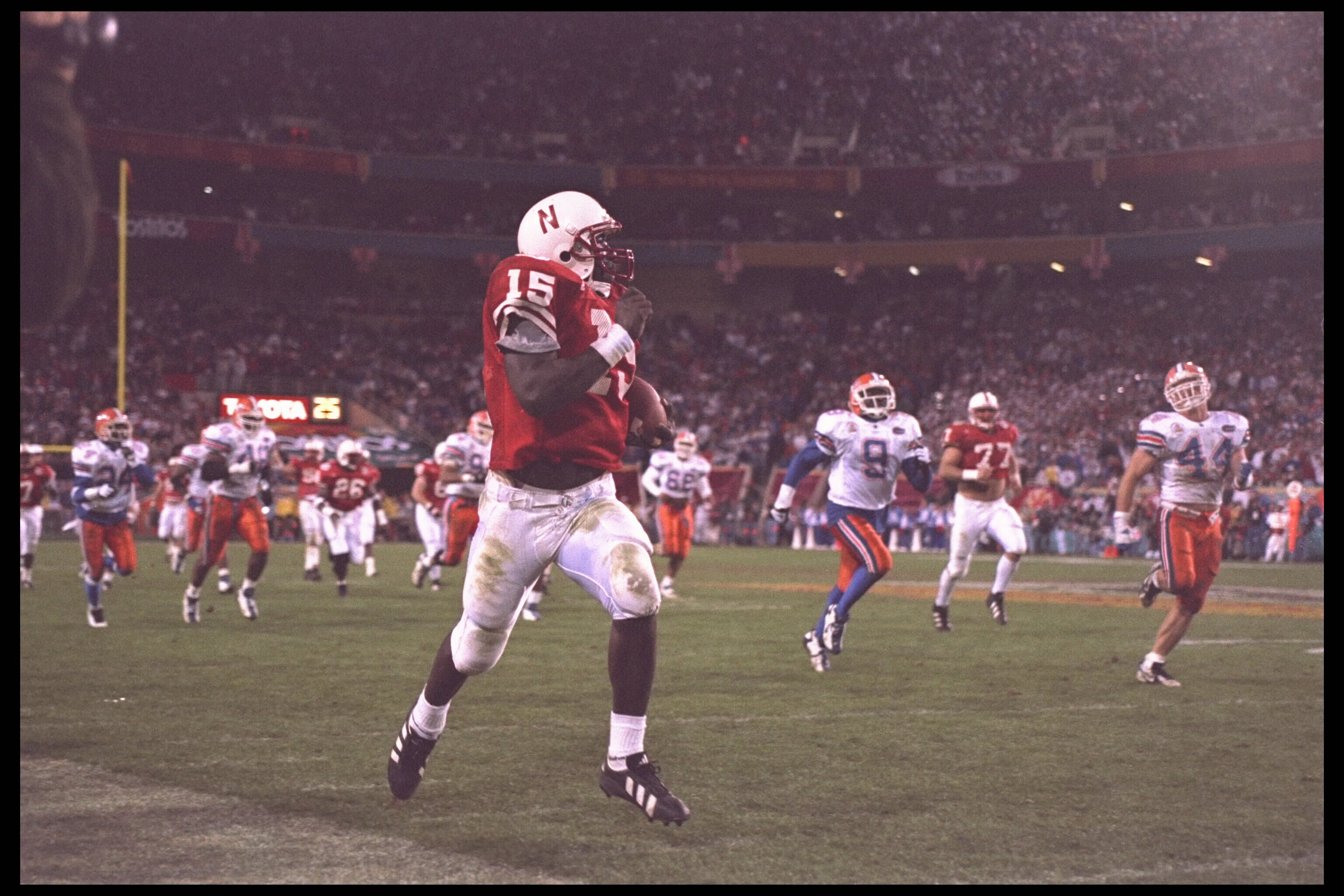
As far as greatness goes, Tommie Frazier takes the cake among all college football players whose amateurism came to an end within the last 25 years.
Frazier never won the Heisman or any of a number of other awards now given out to quarterbacks on a yearly basis, in part because some of them just didn't exist in the mid-1990s when Frazier was at his best.
So while Frazier's trophy case might not be stacked with individual awards like those of Tim Tebow or Matt Leinart, he can still lay claim to being the unquestioned face of two national championship teams, one of which—the 1995 Nebraska Cornhuskers—is often referred to as the greatest of all time.
Though the fact that Frazier was the MVP of the national championship game three years running, even in a loss to Florida State in the 1994 Orange Bowl, is pretty darn impressive.
